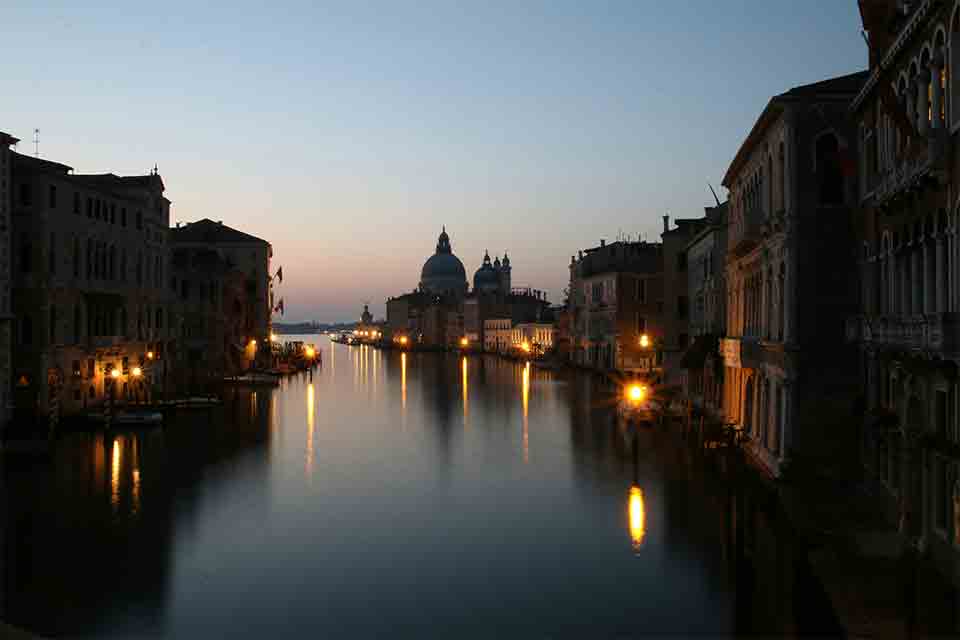Death Takes a Holiday (an excerpt)

Crime novel reviewer Florence (Florrie) Granat takes a bus tour through 1950s Italy. When one of her travel companions dies, she decides to investigate whether it really was natural causes.
death in venice
As a certain Roman once said, sleep resembles death—and perhaps death is just undisturbed sleep. I was musing along those lines as I closed my eyes and drifted off to the land of Nod. No noise to bother me. No whispering waves lapping in the Canal Grande. If there were any thoughts in my head, they were just of sleep: to continue sleeping, letting the rest heal my cuts and bruises.
A thud against the wall, like furniture being rearranged. My eyes flew open. Was that a bed moving? Was someone redecorating? Or—perhaps more likely—were some of my neighbors devoting themselves to what’s known in the world of novels as “lovemaking”? After all, southern Europeans have a reputation—not to mention the exhilarating effect of the southern climate on cool northerners.
The noise quieted, and I sank back into my pillows. It wasn’t going to be like yesterday; I could happily sleep on.
But then came a knock at the door: at first a cautious tapping, then pounding.
“Wer da?” I called, in the first foreign language I could think of, and pulled on my new dressing gown. I wasn’t going to be caught off guard again.
“Florrie! Florrie!” someone shouted outside.
“Who’s there?” I tried, this time in Swedish.
“It’s me, Georg Brandt. Hurry!”
I now dared to open the door. Outside stood Georg Brandt in striped flannel pajamas under a marine-blue dressing gown. His hair sticking up and his eyes wild.
“You’ve got to come! Something’s wrong with Severin. I think he’s dying.”
He spoke fast, even faster than normal, and put his arm around my shoulders to direct me.
“Me? But I’ve no idea . . .”
No idea at all. I’d been exempted from national service and had the measles during first-aid classes in school. Lifesaving was my worst discipline in swimming lessons, and our coach said it would be better to just let the poor soul die straight off. But Georg said, “Come on,” so I grabbed my key, closed the door, and followed him into the neighboring room.
That was where the horrible noise was coming from. In his bed, Fritz Severin was gasping for breath, his face twisted in pain. I didn’t need to look into the trash can to know it was full of bloody vomit.
“How are you, Doctor?” I asked.
He shook his head and tried to wave me off, but started retching again. The trash can wobbled worryingly as he reached for it.
“We need a doctor,” I said. “Does the hotel have one? Or . . . Beth Granfeldt!” I remembered how competently she’d treated my wounds yesterday. “Do you know which room is hers?”
“The next one along. I’m almost certain.”
So I rushed out and banged on the door, and thankfully a grumpy but awake Jarl Granfeldt quickly opened it.
“Severin is sick. We need Beth!”
No question, not the slightest hesitation—as if the interruption were expected. Maybe that was the kind of readiness you got after years at war? Mrs. Granfeldt appeared seconds later, in a red-and-white striped dressing gown that looked like a bathing robe. We returned to the room, and she asked since when he’d been like that. Georg answered—he’d been vomiting for a few hours and had been suffering from stomach trouble before then. We all knew that. Severin had been complaining of his stomach at least since Germany. Now he wasn’t saying anything at all. He was no longer being sick, and something told me that he needed to move to the WC but couldn’t.
“Perhaps a bleeding ulcer,” said Beth Granfeldt. “Or the alcohol. I don’t know if the liver . . .”
Severin attempted to sit up but fell back. Beth wiped his mouth. His breathing was fast and uneven, and her nose wrinkled as she sniffed his exhaled air.
“Garlic. What else was in the food yesterday?”
“Garlic and more garlic,” I said.
“The hotel surely has a doctor. Maybe Mr. Brandt can . . .”
Like a schoolboy on sports day, Georg Brandt sprinted off, far away from this room and its horrors. Severin writhed and fought, battling death, occasionally gripping his stomach and attempting to scream but just groaning weakly. Georg returned in time to see Fritz Severin breathe his last—but by no means peaceful—breath. Beth held his hand and spoke to him as if talking to a sick child. Perhaps nobody had ever been as kind to Severin, the arrogant doctor who’d drunk himself to the bottom and pulled others down with him.
“Now he’s sleeping,” she said.
“Sleeping?” I asked sheepishly.
“To die, to sleep,” said Georg Brandt.
The hotel doctor arrived and formally presented himself as Dottore Luigi Chiusi. He was slender in the manner of many young southern Europeans, someone whose youth didn’t lend an air of assuredness but rather of timidity. He made a quick examination, just to confirm death. Dottore Chiusi—speaking rapidly and in poor French—was difficult to understand, but I managed to grasp he wanted the presence of a travel company representative when he made his report.
With a heavy heart, I woke Elsie. Floods of tears were a given and could be more or less dried with the handkerchief I had in my pocket. I comforted her, agreeing it was the worst trip she’d ever been on. After all, it was hard to imagine anything worse.
“Usually, someone drinking themself senseless is as bad as it gets,” sniffled Elsie.
“There, there,” I said and backed out of the room as she was pulling herself together and changing into her hostess uniform. A few minutes later, when we met the doctor in the corridor, she was as well presented and collected as I was sweaty and disheveled.
“We need to talk!” Georg Brandt whispered in my ear. We left the others and stepped out into the alley. A single lamp lit the gate and above us hung Venice’s sky, black and glorious with twinkling stars—a rare sight in normal cities. Night was about to become day; it was cool but not cold, and there was still nobody around to wonder at a couple in their dressing gowns, lighting their cigarettes and starting an earnest conversation.
“So sad, isn’t it?”
I nodded. “Do you think Severin was murdered?”
He shook his head and shrugged his shoulders. Neither of us was particularly quick-thinking at this hour. Luckily my dressing gown pocket held some cigarettes to wake up the little gray cells.
“He’d actually been really sick,” I mused.
“Forgive me for putting it so indelicately, but you don’t have to be poisoned to vomit. The doctor wasn’t certain.”
“I think the Granfeldts are pushing for it to be declared a natural death.”
“And our little hostess wants to keep moving since this is,” he pretended to sniffle, “the wo-worst tr-trip I’ve ever been on!”
“How would you feel if you were in charge? Imagine if you were on a school trip . . .”
“Shush! We’ll wake the others.”
I took a breath. The Canal Grande gurgled but a few steps away, close enough for him to have been pushed in. Or off the Campanile in St. Mark’s Square. With the crowd and Severin’s general wobbliness, nobody would have suspected a thing, I thought. Shame on me. “He wasn’t particularly nice. Even if there was a certain polish.”
With the crowd and Severin’s general wobbliness, nobody would have suspected a thing.
“Remains of a polish, maybe. Actually,” Georg whispered, “it’s strange nobody murdered him earlier.”
“Are you just saying that because he snored?”
“No. Such a mess!”
We drew breath in unison, looked out over the Canal Grande’s deep blue water, and observed a moment’s silence for the deceased, even without warm thoughts. Small lanterns cast a weak light over the canal—not street lanterns, canal lanterns.
“Alright,” I said. “What shall we do? Either Jarl Granfeldt will succeed in insisting it was a natural death and we can continue our trip—but if Severin’s really been poisoned then a murderer would go free—or we can call the police and kiss our trip to Rome goodbye. And we’d risk being put through the wringer, which wouldn’t exactly be pleasant.”
For some reason, I’d reverted to language that was more fitting of Mickey Spillane than Agatha Christie. Maybe it was the lack of sleep. Oh, to sleep through a whole night without drama! And yet I felt totally alive.

For some reason, I’d reverted to language that was more fitting of Mickey Spillane than Agatha Christie.
“Since I imagine several of us would be treated as suspects,” I continued. “What about Einar Björkfor’s politics? Or my own? Will the police here regard the Finnish veterans as honorable military men or disreputable right-wingers?”
“I was in the Communist Party when I was fourteen. And Bosse Petterson is a trade union secretary.”
“Are we doom-mongering?” I took a final puff and threw the butt into the canal. “But Italy is still a civilized country. Although they did string Mussolini up by his toes.”
“Wouldn’t it just be best if we journeyed on?”
“Yes. Let’s go in and appear like responsible citizens. Teachers are certainly respectable in Italy.”
“Especially in flannel pajamas,” said Georg Brandt. He almost laughed.
It was a motley crew in the reception. The first thing I saw was Beth Granfeldt’s awning-striped figure, the second an increased presence of well-tailored Italian suits. The management had appeared—either from within the hotel building or through some back entrance—and was involved in a lively conversation with the doctor, Elsie, and Jarl Grandfeldt.
“It’s good that you’re here,” said Jarl, maintaining his authority. “The manager would like to know more about Severin’s sickness, and you, Mr. Brandt, must be able to tell us.”
The manager greeted us in German, and we presented ourselves with as much dignity as possible in our bedclothes. I was glad he used German, since I spoke it better than both French and English. He didn’t say his actual name—he was simply the manager—but he presented the man accompanying him as Federico Fabretti and called him his consigliere, his legal adviser.
Georg now told him about the night’s events, followed by Elsie’s summary of the course of Severin’s illness—stomach cramps, Samarin, and a visit to the doctor in Bolzano.
“You can’t rely on people in Bolzano,” the hotel’s doctor said. “They’re practically German.” He made a face as if he had just found something rotten in the canal. The manager, consigliere, and even the receptionist mirrored his discomfort.
Jarl Granfeldt cast an eye over his travel companions, an unspoken admonishment to avoid any talk of German accuracy, precision, order, or discipline. We stayed silent. Despite his prejudices against the Tyrolians, Doctor Chiusi had put his finger on the problem. Shouldn’t a doctor who’d met Severin while he was alive have noticed he’d been poisoned? The recommendation to eat healthy bread and avoid wine was no indication that the patient would die in less than two days.
“It’s very regrettable that our comrade has died,” said Jarl Grandfeldt. “But in reality, he’s been sick the whole journey. Couldn’t it have been a stomach ulcer? Or liver damage?”
Elsie translated to Italian, and the conversation carried on in French, in German, in Italian, and even occasionally also in Swedish. Doctor Chiusi said it takes time to die of a stomach ulcer and the symptoms were not consistent with liver cirrhosis, but that many common poisons cause stomach pains and sickness.
“He was a foreigner, dear Doctor Chiusi!” the manager said, making it sound like the Nordic digestive system was different in nature to the southern European one.
“As a doctor, it’s my duty to report suspicious deaths. Gentlemen, I have given an oath! The medical profession is a vocation . . .” I listened to his singsong pronunciation of “professione” and “vocazione” and reflected on the trip to Italy I’d imagined compared to the one I’d ended up on.
“I demand the police be informed of the death and an autopsy carried out on the deceased!” His eyes burned, dark and beautiful. Youth’s suffering and ideals still lived on in Doctor Chiusi.
“Our friend is dead,” Granfeldt said in French. “None of us can do anything about it. He didn’t have a wife, no children . . .”
Elsie sniffled and was given a warning glance. She pressed the silk handkerchief to her mouth, lowered her eyelashes to her cheeks, swallowed, and stayed silent.
“You’re completely right, monsieur,” the manager said. “None of us have anything to gain by calling in the police. For us, a load of stupid Sicilian carabinieri poking around the hotel would be regrettable. If the autopsy really showed that something untoward had occurred, it would destroy our reputation, scare off tourists, and end in a catastrophe.”
“But justice, monsieur le directeur!” said Elsie.
“Mademoiselle, how would it look for your travel company if rumors circulated about people getting murdered on your trips? And what would your employer think of your ability, after not noticing that one of your tourists—whom you, mademoiselle, have been observing for several days—was actually dying?”
Elsie opened her eyes. Now she was no longer sniffing, but large round tears were running unchecked down her rosy cheeks.
I put my arm around her. “Leave the girl alone!”
“I think we agree, monsieur,” said Jarl Granfeldt. “A police investigation would only be bad news. Of course we need to arrange for the repatriation of the body.”
“We have a very pretty graveyard at Isola San Michele, monsieur. Nowadays there’s even a Protestant section. And didn’t your friend want to be in Italy?”
“True, that’s what he wanted. It sounds very pretty and suitable.”
“Of course, it costs a fine penny . . .”
“Naturally. It won’t be a problem.”
“Again, I must protest!” said Doctor Chiusi, now angry and gesticulating. He spoke in Italian, but by this stage I understood. The message was ethical but one-sided.
The consigliere smiled at him. There was nothing friendly about it.
“Doctor Chiusi! Don’t you have a sister? Young, beautiful . . . seventeen, isn’t she? And also an old mother?”
Maybe the legal counsel’s voice would have sounded soft if it didn’t have such a threatening tone. I’ve never seen somebody get hit, but that’s how it must look. Luigi Chiusi’s whole body changed. His bright eyes hardened and became expressionless. His beautiful olive complexion blanched to a pale green, and the until-now imperceptible stubble darkened to a beard. He stepped back, and if I hadn’t already had my arms around Elsie, I would have tried to support him.
“You’re of course right, consigliere. I rushed into things.”
The man smiled, a smile like Scarpia, and I shivered. Elsie shook against my body.
“And you, Dottore, can arrange things so that it will be a nice burial. I’m sure mademoiselle Elsie here wants to continue the journey as planned.” He spat out the title “dottore,” used by the Italians for any man who even got close to a university.
The pale young man nodded. “I can do it, Signor Fabretti. I can do it.”
Georg handed him the key to the room. The doctor took a few steps back, called out “au revoir, mesdames et messieurs!” to us Swedes, and fled up the stairs.
“Are we agreed?” asked Jarl. “You can arrange everything here, and we can journey on.”
“For my part, yes. Signor Fabretti can arrange the rest.”
The simple sight of Signor Fabretti scared me out of my mind. On the outside he was a sophisticated Italian gentleman—well dressed in suit and tie at three o’clock in the morning, just like the manager—but underneath the silk shirt I sensed pure evil, cold and studied. Not insanity like Caligula, but more akin to the despots who’d quite recently dominated Europe. I wished I were far away. Furthermore, I realized the doctor had likely gone up to Fritz Severin’s body, and I was curious to know what had happened. So, I let go of Elsie and ran up the stairs.
As far as I understood, the discussion down in the lobby was over. The only interesting thing was perhaps what Beth Granfeldt later told me, that Jarl had taken Elsie to one side and asked if the travel agency had sent money with her for unforeseen expenses. They had, and he said that she should go and get it, all of it, and give it to the consigliere. “It looked like quite a lot,” Beth said later. “Several thousand.” I’d seen Elsie rush past in the corridor, so I could easily believe the story, and I bumped into her in the deceased’s room soon after.
It had now become “the deceased’s room,” not Fritz Severin’s and Georg Brandt’s. As I entered, I realized that Doctor Chiusi was on his own in there. Severin looked less human than when I’d left the room. His face appeared yellow and his chin had dropped.
The doctor was bent over Fritz and looked worried, but when I came in he glanced up.
“I’ll ask my mother and sister to prepare him for burial. Even you Lutherans . . . ?”
Yes, even us. I picked up the Bible from the drawer of the bedside table and gave it to him to place under the chin. As an experienced reviewer of crime novels, I knew everything about rigor mortis. Even if it would take a while for it to set in, it was best to take preventive action. Annoyingly, I didn’t remember exactly when it set in, even though Dorothy L. Sayers had explained it so thoroughly in The Unpleasantness at the Bellona Club. Sometimes you missed Lord Peter Wimsey in real life.
Translation from the Swedish
Translator’s note: Excerpted from Döden tar Semester (Death takes a holiday), by Carina Burman, translated by Catherine Venner.










